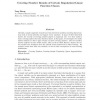176 search results - page 8 / 36 » The complexity of properly learning simple concept classes |
COGSCI
2010
13 years 9 months ago
2010
People are remarkably smart: They use language, possess complex motor skills, make nontrivial inferences, develop and use scientific theories, make laws, and adapt to complex dyna...
ECML
1997
Springer
14 years 28 days ago
1997
Springer
In learning from examples it is often useful to expand an attribute-vector representation by intermediate concepts. The usual advantage of such structuring of the learning problemi...
JMLR
2002
13 years 8 months ago
2002
Recently, sample complexity bounds have been derived for problems involving linear functions such as neural networks and support vector machines. In many of these theoretical stud...
DIGITEL
2008
IEEE
14 years 3 months ago
2008
IEEE
We present progress with roBlocks, a reconfigurable modular robotic system for education. Children snap together small, magnetic, heterogeneous modules to create larger, more comp...
CSB
2005
IEEE
14 years 2 months ago
2005
IEEE
In the feature selection of cancer classification problems, many existing methods consider genes individually by choosing the top genes which have the most significant signal-to...

